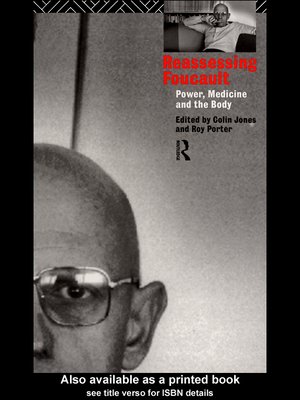Reassessing Foucault
ebook ∣ Power, Medicine and the Body · Studies in the Social History of Medicine
By Colin Jones

Sign up to save your library
With an OverDrive account, you can save your favorite libraries for at-a-glance information about availability. Find out more about OverDrive accounts.
Find this title in Libby, the library reading app by OverDrive.



Search for a digital library with this title
Title found at these libraries:
| Loading... |
No thinker has had so great an impact upon the intellectual life of the last couple of decades as Michel Foucault. Foucault's work, however, was dense and remains controversial. As we approach the tenth anniversary of his death, it is appropriate to re-examine his ideas and their influence in many areas of the social sciences and the history of ideas and culture.
Foucault's work has proved provocative on a number of different planes. In terms of methodology, he challenged the outlooks of the history of ideas, denying continuity and progress and the stability of disciplines. In specific fields of enquiry, such as the history of madness or of prisons, he set out to expose the essentially mythic nature of the established narratives and analytical frameworks. And, most concretely, he produces radically new readings of central figures and bodies of thought, not least of Freud and psychoanalysis.
Through his iconoclastic accounts Foucault won many followers and created many enemies. Reassessing Foucault sets out neither to bury Foucault nor to praise him, but to subject his key teachings in many fields to close scrutinay. Chapters dealing with his methodological and philosophical writings, his ideas about prisons, hospitals and other institutions, his views on madness, health and disease, and his thinking about the body successively engage with principal aspects of his thought and relevance, and suggest ways in which Foucault's influence will continue to dominate cultural history and the social sciences.
Foucault's work has proved provocative on a number of different planes. In terms of methodology, he challenged the outlooks of the history of ideas, denying continuity and progress and the stability of disciplines. In specific fields of enquiry, such as the history of madness or of prisons, he set out to expose the essentially mythic nature of the established narratives and analytical frameworks. And, most concretely, he produces radically new readings of central figures and bodies of thought, not least of Freud and psychoanalysis.
Through his iconoclastic accounts Foucault won many followers and created many enemies. Reassessing Foucault sets out neither to bury Foucault nor to praise him, but to subject his key teachings in many fields to close scrutinay. Chapters dealing with his methodological and philosophical writings, his ideas about prisons, hospitals and other institutions, his views on madness, health and disease, and his thinking about the body successively engage with principal aspects of his thought and relevance, and suggest ways in which Foucault's influence will continue to dominate cultural history and the social sciences.






